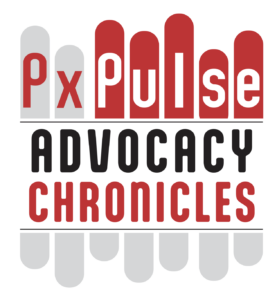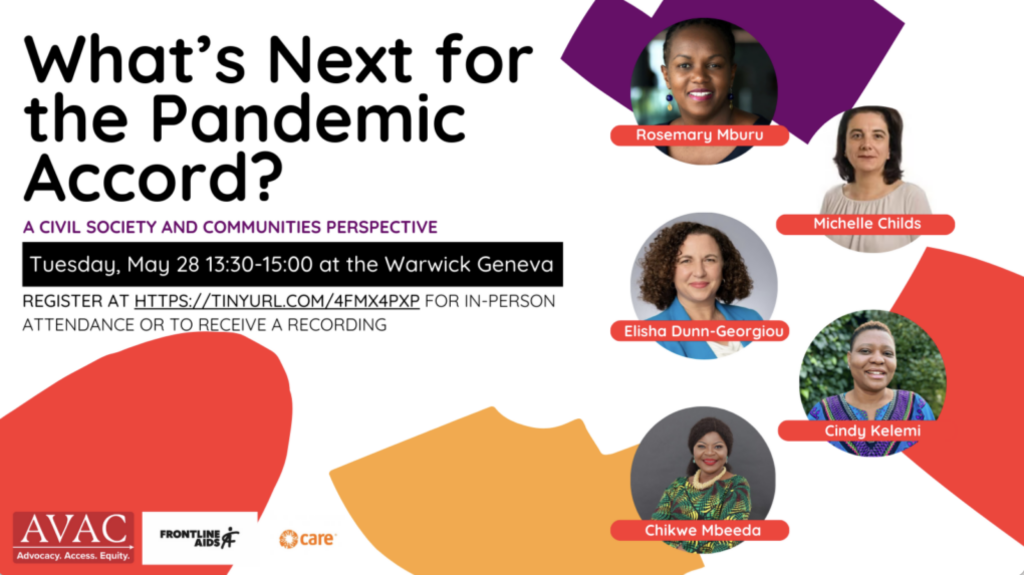An analysis presented at IAS2024, HIV Pre-Exposure Prophylaxis Policies Worldwide, by the Georgetown University Center for Global Health Policy & Politics has found 69% of 194 countries reviewed have approved at least one PrEP product. But only 52% of the countries reviewed follow WHO guidance on PrEP eligibility with regulatory approvals and national policies that support PrEP eligibility for all populations or people at risk.
HIV Pre-Exposure Prophylaxis Policies Worldwide
PxPulse: The Advocacy Chronicles with Ruth Akulu

On this episode of the Advocacy Chronicles: a look at advocacy in Uganda for the Dual Prevention Pill (DPP), a new product combining oral PrEP and oral contraception.
Ruth Akulu is a Youth Representative of the Uganda Country Coordinating Mechanism Board for Global Fund, member of the DPP Civil Society Advisory Group, and a 2022 AVAC Advocacy Fellow. Akulu talks about her work to mobilize regulatory authorities to prepare for the DPP. And while she was at it, the establishment of a groundbreaking new initiative, the Product Regulator’s Engagement Committee, which is supporting ongoing engagement between government regulators and young women representing their communities.
Listen to learn why the DPP is a priority for young women and HIV prevention, the challenges Ruth confronted and tactics that supported the success of this advocacy.
Listen
Resources
- The Advocates’ Guide to Multipurpose Prevention Technologies
- The Dual Prevention Pill page on PrEPWatch.org
- FAQ on the Dual Prevention Pill
- Market Preparation and Introduction Strategy for the DPP (Executive Summary also available)
- Frontiers in Reproductive Health special issue: Multipurpose Prevention Technologies
PrEP Justice
In a major twist that could potentially result in as much as $1B for equitable PrEP access in the US, the government has just made the decision to appeal last year’s jury verdict in the US v. Gilead case. The Choice Agenda and PrEP4All discussed the origin of US v. Gilead, the reasons for the government appeal, and what the case means for PrEP users in the United States.
Global HIV Prevention Advocates Call for Accelerated Timeline for Widespread Access to Injectable Lenacapavir for PrEP
A global cadre of HIV prevention advocates is calling for an accelerated timeline for access to the HIV prevention drug lenacapavir. Gilead, the developer of the drug, announced topline results from a large study among cisgender African women on 20 June, followed shortly thereafter with a statement about access.
From The Lab To The Jab: Lessons learned and what’s next in HIV vaccine research
On 3 June 2024, AVAC hosted a webinar highlighting its Lab to Jab issue briefs on research and development, production and equitable global access to vaccines.
Platforms, Not Pathogens
“[Our approach to access and equity] has to be intentional, not incidental, and it has to be empowered, not vulnerable.” — Dr. Jerome Kim, International Vaccine Institute
Panelists stressed an intentional, rather than incidental approach to ensuring global vaccine access and equity, going from pathogens to platforms, and having LMICs move from consumers to actors. They described ways to transform vaccine R & D from a financial imperative of pharmaceutical corporations into a system that addresses health needs through medical innovation. They underscored the importance of new, equity-based models to move low- and middle-income countries from being recipients of vaccine technology to co-creators from the very beginning of the R & D process. These models can work through in-country partnerships for vaccine development and production, shared technology and know-how, use of TRIPS flexibilities, intellectual property waivers and access conditions, and establishing a local production ecosystems.
The webinar featured Dr Jerome Kim, Director General of the International Vaccine Institute, Othoman Mellouk, Access to Diagnostics and Medicines Lead at the International Treatment Preparedness Coalition, and Dr Els Torreele, Founding Director of æqua, a recently created think tank on equity and economic justice for health. The panelists discussed international initiatives for vaccine development, the current state of vaccine research and access, and how they can be improved.
From Consumers to Actors
“Driving innovation at the regional R&D hubs means creating access to the technology platforms that can be adapted to new pathogens or the local health needs.” — Dr. Els Torreele, æqua
As of December 2023, only 56% of the world’s population received a complete series of COVID-19 vaccines, and only 28% had at least one booster dose. Many low- and middle-income countries (LMIC) were last in line to purchase overpriced vaccines. Lack of access to Mpox vaccines in Africa, where it is endemic, continues. These inequities are driven by the current profit-driven model and intellectual property barriers—but there could be a different way.
One major initiative discussed is being spearheaded by the International Vaccine Initiative (IVI), a UN-chartered organization dedicated to accelerating vaccine R&D for global health. Through its robust partnerships, and funding from the Gates Foundation, it has developed two approved vaccines (for cholera and thyphoid)–for less than $30 million each. The IVI also hosts the Advancing Vaccine End-to-End Capabilities in Africa (AVEC) Initiative, which aims to accelerate the development of the African ecosystem for vaccine R&D. Its aim is to support a powerhouse of continental manufacturing through a sustainable pan-African alliance that executes on the ground.
For more information, see:
- Recording and slides
- From The Lab To The Jab series
- HVAD webinar recording
- Px Pulse podcast with Nina Russell
On Access and Equity
“The problem is, until now, our countries are thinking mostly as consumers, not as actors. We only heard a little bit about some initiatives during COVID, because everybody woke up.” — Othoman Mellouk, International Treatment Preparedness Coalition
Landmark Trial in South Africa and Uganda Finds Twice Yearly HIV Prevention Injection Safe and Highly Effective
Adding additional HIV prevention options means more people may find an option that is right for them. Beyond expanded choice, a twice-yearly injection has the potential to transform the way we deliver HIV prevention to people who need and want it most.
Advocates’ Guide to Doxycycline to Prevent Bacterial STIs (DoxyPEP)
Doxycycline, an oral antibiotic commonly referred to as DoxyPEP, is a post-exposure prophylaxis used to prevent the acquisition of some bacterial STIs after sex. Doxycycline is inexpensive, easily tolerated, and widely available. However, questions remain regarding who will benefit most from DoxyPEP and how to implement this strategy broadly to ensure equitable access. This guide seeks to explore and address these critical questions.
Advocates’ Guide for PPPR
If you’re having trouble making sense of all of the initiatives around pandemic prevention, preparedness, and response (PPPR) this year, don’t worry—you’re not alone! This Advocates Guide provides a reference for the relevant information all in one place. The contents explain the major initiatives, key dates for involvement, how to get involved and make sure your priorities are heard by decision makers.
PxPulse: The Advocacy Chronicles with SMUG’s Allan Mwasa

On this episode of The Advocacy Chronicles, we’re speaking with Nsubuga Allan Mwasa, a Ugandan activist, clinical psychologist and an advocate for mental health and LGBTQ+ rights. Allan serves as Strategic Initiatives Manager at Sexual Minorities Uganda, or SMUG, which has been at the forefront of the fight for LGBTQ rights, often facing severe challenges including legal battles and violent opposition.
Despite these challenges, SMUG continues to advocate for the fundamental human rights of the LGBTQ community. It does this through legal action, public awareness campaigns, and international advocacy. SMUG is also part of Convening For Equality Uganda, or CFE, a coalition of civil society groups dedicated to challenging Uganda’s Anti-Homosexuality Act. The Anti-Homosexuality Act (AHA), signed into law in May 2023, significantly increased discrimination and violence against the LGBTQ+ community. Despite widespread international condemnation and ongoing legal challenges, the law was upheld by the Constitutional Court in April 2024. Petitioners have since filed an appeal to the Supreme Court seeking to overturn the law, which remains one of the strictest in the world, including life imprisonment and death penalty for certain offenses.
Listen
Resources
- Donate to support SMUG, CFE, The Strategic Response Team (SRT), and their work responding to human rights violations against LGBTIQ+ communities in Uganda
- Eteeka Lyayhita…Unwanted, Outlawed and Illegal: The Cry of LGBTIQ+ Ugandans, SRT Report, June 2024
- Discrimination in Public Health: How Funders Should Fight Laws Like Uganda’s Anti-Homosexuality Act, Center for Strategic and International Studies
- Uganda: Court Upholds Anti-Homosexuality Act, Human Rights Watch
- Eteeka Lyayita…Lives At Risk, SRT Report, September 2023
- Sharp rise in homophobia in East Africa sparks fear of violence, Health Policy Watch
- UN rights experts condemn Uganda’s “egregious” anti-LGBT legislation, UN News
Follow the Conversation at Convening For Equality Uganda’s Social Media Accounts
- @CFE_Uganda and #RepealAHA23 on X
- @conveningforequality on Threads
- @conveningforequality on Instagram
What’s Next for the Pandemic Accord? A civil society and communities perspective
This side event, co-sponsored with Care and Frontline AIDS, was part of the World Health Assembly and featured expert panelists discussing what’s promising in the Pandemic Accord, what we expect from governments, and what’s missing for successful implementation. Selected panelists came from different health areas but all have experience in pandemic prevention, preparedness, and response.
This panel also helped civil society prepare for the coming year and gain capacity to meaningfully engage in advocacy around implementation of the Accord.
